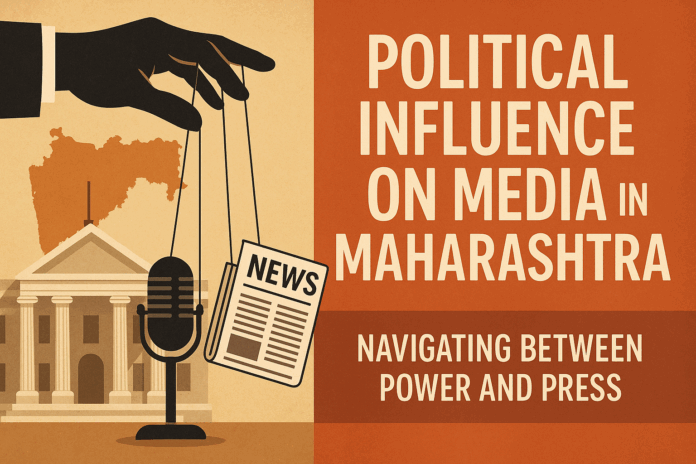🏛️ Political Influence on Media in Maharashtra: Navigating Between Power and Press
Maharashtra, with its vibrant democracy and dynamic media industry, has long been a center of political discourse and journalistic activism. However, like many other parts of India, the state’s media landscape has increasingly come under the shadow of political influence—raising important questions about editorial freedom, neutrality, and the role of the press in a democracy.
🗳️ A Politically Charged Environment
Maharashtra’s political scene is intensely competitive and deeply polarized. With major players such as:
-
BJP (Bharatiya Janata Party)
-
Shiv Sena (now divided into the Uddhav Thackeray and Eknath Shinde factions)
-
Congress and NCP (Nationalist Congress Party)
…the state experiences frequent shifts in alliances, strong ideological divides, and aggressive election campaigns. This charged political atmosphere inevitably spills over into the media space.
📰 Media Alignments and Perceptions
While many media houses strive for journalistic integrity, several are perceived as being aligned—openly or subtly—with political parties:
-
Some Marathi newspapers and TV channels are seen as leaning towards the Shiv Sena (Uddhav faction) or championing BJP narratives.
-
Others reflect the Congress-NCP perspective, especially during state-level political debates or election cycles.
-
Certain digital platforms, while claiming neutrality, often adopt tones or selectively amplify voices that hint at ideological leanings.
This perception of bias does not always mean direct political control—but it reflects how ownership patterns, editorial choices, and funding sources can influence the tone and coverage of news.
💰 The Rise of Paid News & Sponsored Content
One of the most concerning impacts of political influence is the infiltration of paid news—where content appears to be news but is actually sponsored or influenced by political entities.
-
During elections, it is common to see front-page features, positive stories, and interviews that subtly or directly promote specific candidates or parties.
-
These are often not marked as advertisements, blurring the line between journalism and propaganda.
-
This practice not only misleads the public but damages the credibility of journalism as a whole.
Paid news has been flagged by both the Press Council of India and the Election Commission, yet enforcement remains weak.
⚖️ Press Freedom vs Political Pressure
Despite constitutional guarantees and Maharashtra’s proud history of fearless journalism, press freedom in practice is under pressure:
-
Editors and reporters sometimes face direct or indirect threats from political figures or party supporters.
-
Business lobbies with political connections can influence what gets published—especially in cases involving land, infrastructure, corruption, or government tenders.
-
Journalists in rural or semi-urban districts are more vulnerable, lacking the institutional protection that big-city reporters might have.
This environment creates a subtle form of censorship—not through law, but through intimidation, self-censorship, or editorial compromise.
💡 Glimmers of Courage and Independence
Yet, not all is bleak. Maharashtra continues to be home to many fearless journalists, independent news platforms, and whistleblower reporters who stand against political pressure:
-
Investigative reports on corruption, scams, police excesses, and local governance issues frequently emerge from committed individuals and small outlets.
-
Digital platforms, citizen journalism, and social media-based fact-checkers are offering alternative voices, holding power to account.
-
Public support for transparent and ethical journalism is growing, especially among younger audiences and civic groups.
This ongoing struggle between political influence and press independence reflects the larger battle for democracy and accountability in India.
🏁 Conclusion: A Press at the Crossroads
In Maharashtra, the media operates at a crossroads—caught between political interests and public duty. The challenge lies in preserving editorial independence, protecting journalists, and ensuring that media serves people, not power.
While political influence is a reality, the enduring commitment of ethical journalists and informed citizens ensures that the spirit of true journalism—fearless, free, and fair—remains alive.
The question is not whether political influence exists—it clearly does. The real issue is: Can the media stand strong enough to resist it and remain the voice of the people?









